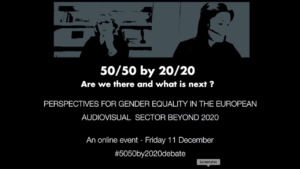
Events, FERA Speaks, Gender balance, News
FERA promotes Equal Pay and Equal Opportunity for female filmmakers at Industry Events

On December 10 and December 11 two industry online events promoting gender balance and inclusion in the audiovisual industry in Europe took place: “Diversity and Inclusion in the Audiovisual Industry”, organized by the European Audiovisual Observatory and “50/50 by 2020 – Are We There & What Is Next? Perspectives for Gender Equality in the European Audiovisual Sector Beyond 2020” organized by Cineuropa, EWA (European Women’s Audiovisual Network), EFAD (European Film Agencies) and UNI Europa.
FERA CEO Pauline Durand-Vialle was one of the speakers in both events, where she presented findings from the European Survey on the Remuneration of Audiovisual Authors as background for promoting gender equality and equal pay as well as tracking up-to-date data for monitoring the progress of reaching equal pay.
The European Survey on the Remuneration of Audiovisual Authors finds that only 36% of audiovisual authors in Europe are female, and that a median female audiovisual author makes between 1.500 and 6.000 EUR less in a year than their male counterparts.
Weak remuneration levels of directors – for workflow reasons among other things – are a major problem for our community. For women the situation is even more difficult, as they typically are confronted with more work/life balance challenges. Working on a smaller number of projects also ends up generating less authors’ rights for women creators, which is particularly damaging in a COVID-19 context where secondary income is crucial for the economic survival of authors.
Our recent study shows 36% of audiovisual authors are women, while production figures involving female authors seem to top around 20% at best. As our industry is clearly failing to ensure equal opportunity for female filmmakers, we believe that improving directors’ professional collective representation and collective bargaining ability is essential to improve the gender balance in our sector.
Our sector has the means to tackle this issue now – provided all decision-making bodies commit to a target corresponding to the existing female workforce. These skilled professionals are ready to work, trained also thanks to mentoring schemes that have developed over the last few years.
It is essential not to drop the ball on gender equality policies in our sector in the wake of the COVID-19 crisis, because fragile freelancers are particularly exposed in this crisis, and because we have all seen the effect of the lockdown on work-life balance particularly for women. We believe there are a number of collective actions that can be continued and enhanced, with two important focuses:
– Assess the impact of the C-19 crisis on gender equality – therefore continue to produce data,
– Level the playing field between bigger and smaller production countries, to ensure cultural diversity in gender mainstreaming efforts.
Both panels are available online, click below to watch:

